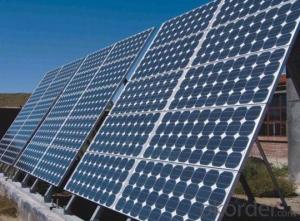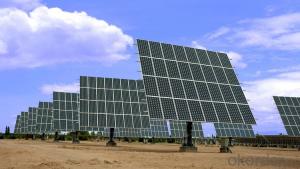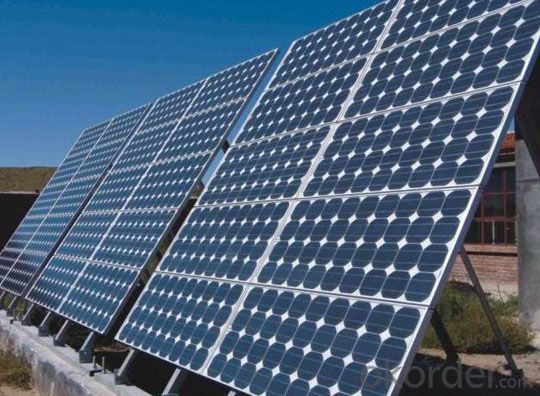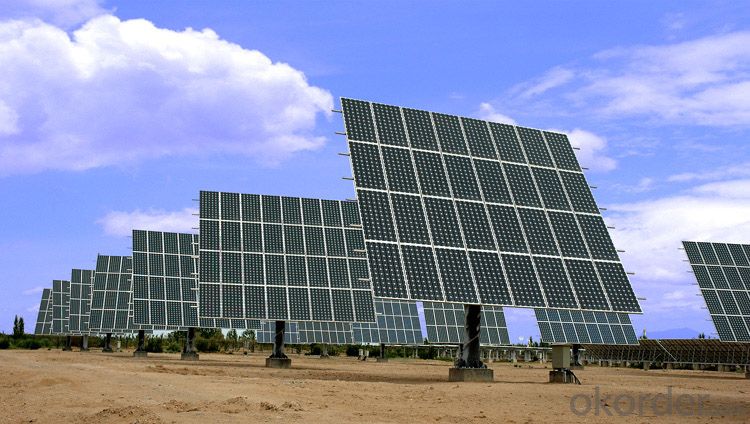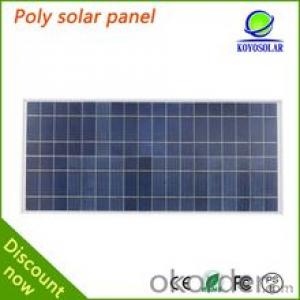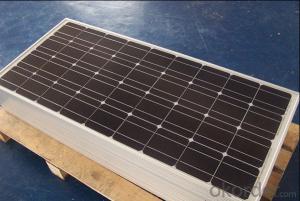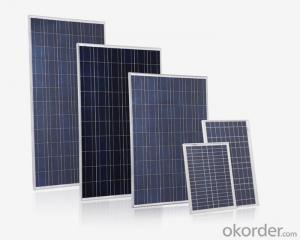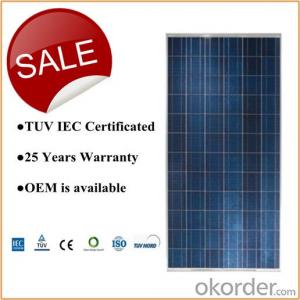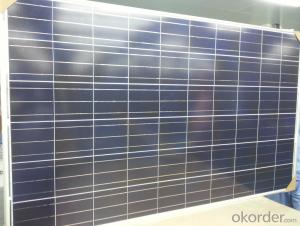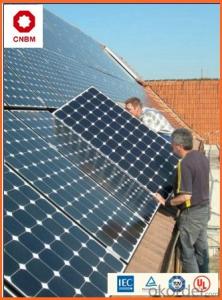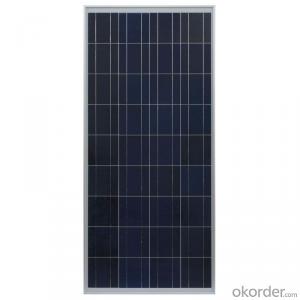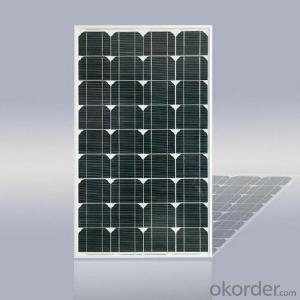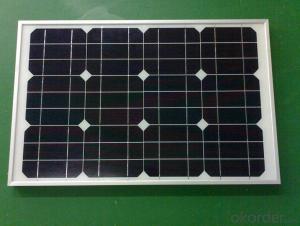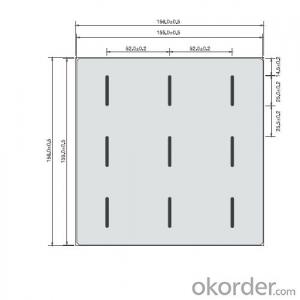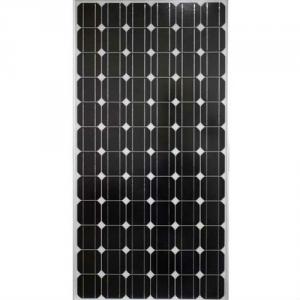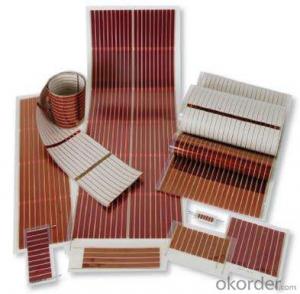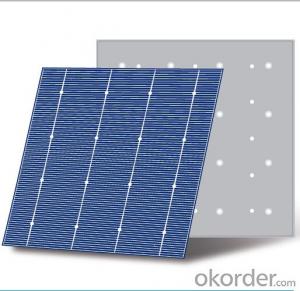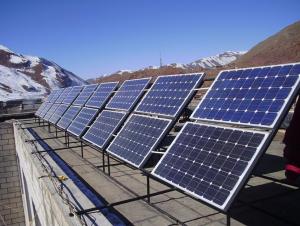Solar Cells Canada - Sales Solar Panels 280w Poly 72pcs Cells 36v
- Loading Port:
- China Main Port
- Payment Terms:
- TT OR LC
- Min Order Qty:
- -
- Supply Capability:
- 10000000000000 watt/month
OKorder Service Pledge
Quality Product, Order Online Tracking, Timely Delivery
OKorder Financial Service
Credit Rating, Credit Services, Credit Purchasing
You Might Also Like
Quick Details
| Place of Origin: | Guangdong China (Mainland) | Brand Name: | sunshine | Model Number: | sy-280p |
| Material: | Polycrystalline Silicon | Size: | 1960*980*40mm | Number of Cells: | 72PCS |
| Max. Power: | 280W | VOC: | 36V |
Packaging & Delivery
| Packaging Detail: | Crate |
| Delivery Detail: | 30 |
Specifications
1, A grade solar cell
2,Life of 20-35 years
3,Super quality competitve price
4,International Standard
solar panels 280W poly Specification
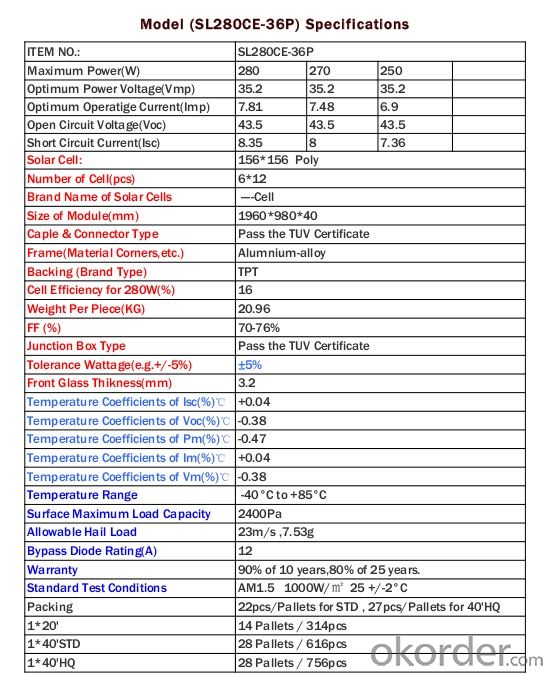
- Q: How can the solar power change our life by using solar cells material?
- There is a lot of research indicating that by the mass use of solar cells, the solar power is becoming one of the least expensive overall sources of power
- Q: What is the impact of electromagnetic interference on solar cell performance?
- Electromagnetic interference (EMI) can have a significant impact on the performance of solar cells. EMI refers to the disturbance caused by electromagnetic radiation from external sources, such as power lines, electronic devices, or radio frequency signals. This interference can disrupt the normal functioning of solar cells and degrade their efficiency. EMI can lead to reduced power output and overall performance degradation of solar cells. The electromagnetic waves can induce unwanted electrical currents or voltages in the solar cell, which can interfere with the normal flow of electrons and cause power losses. Additionally, EMI can introduce noise and create fluctuations in the output voltage or current of the solar cell, affecting the stability and reliability of the system. To minimize the impact of EMI on solar cell performance, various mitigation techniques can be employed. These include utilizing shielding materials or enclosures to block electromagnetic radiation, implementing proper grounding and isolation techniques, and using filters or suppressors to reduce unwanted electromagnetic signals. Moreover, adhering to electromagnetic compatibility standards during the design and installation of solar systems can help mitigate the effects of EMI and ensure optimal performance of solar cells.
- Q: Can solar cells be used in agriculture for irrigation?
- Yes, solar cells can be used in agriculture for irrigation. Solar-powered water pumps can be used to draw water from wells or other sources, providing a reliable and sustainable solution for irrigation. This helps farmers reduce their dependence on traditional energy sources and decrease operational costs, making solar cells a viable option for agricultural irrigation.
- Q: How do solar cells convert sunlight into electricity?
- Solar cells convert sunlight into electricity through a process called the photovoltaic effect. The cells are made of semiconductor materials, usually silicon, that absorb photons from the sunlight. These absorbed photons excite the electrons in the material, allowing them to break free from their atomic bonds. The freed electrons then flow through the cell's material, creating an electric current. This current can be harnessed and used as electricity to power various devices and systems.
- Q: How do solar cells perform in areas with limited space for installation?
- Solar cells can still perform effectively in areas with limited space for installation by utilizing innovative technologies such as rooftop solar panels, vertical solar panels, or solar panels integrated into building materials. These compact and space-efficient designs allow for the generation of solar energy even in tight spaces, making it possible to harness the benefits of solar power without requiring vast expanses of land.
- Q: What is the impact of solar cells on reducing energy poverty?
- Solar cells have a significant impact on reducing energy poverty by providing access to electricity in remote areas that are not connected to the grid. They offer a reliable and sustainable source of power, enabling households to meet their basic energy needs and improve their quality of life. Additionally, solar cells reduce dependence on expensive and polluting fossil fuels, making energy more affordable and environmentally friendly for those living in poverty.
- Q: Can solar cells be used to power irrigation systems?
- Yes, solar cells can be used to power irrigation systems. Solar cells convert sunlight into electricity, which can be stored in batteries and used to power irrigation systems. This provides a sustainable and renewable energy source for agriculture and reduces dependency on traditional power grids.
- Q: How do solar cells perform in coastal areas?
- Solar cells can perform well in coastal areas, as they can take advantage of the abundant sunlight and reflectivity from the water. However, the salty and humid environment may cause corrosion and reduce their efficiency over time, making regular maintenance and protective measures necessary to ensure optimal performance.
- Q: Can solar cells be used in remote areas with no access to electricity?
- Yes, solar cells can be used in remote areas with no access to electricity. Solar cells harness the energy from sunlight and convert it into electricity, making them an ideal solution for areas that lack access to traditional power grids. They can be installed in remote locations to provide clean and renewable energy, enabling the communities to meet their basic electricity needs.
- Q: Can solar cells be recycled?
- Yes, solar cells can be recycled. The process involves separating the different components, such as glass, metals, and semiconductors, and reusing or repurposing them for new solar cell production or other industries. Recycling solar cells helps reduce waste and environmental impact while also conserving valuable resources.
Send your message to us
Solar Cells Canada - Sales Solar Panels 280w Poly 72pcs Cells 36v
- Loading Port:
- China Main Port
- Payment Terms:
- TT OR LC
- Min Order Qty:
- -
- Supply Capability:
- 10000000000000 watt/month
OKorder Service Pledge
Quality Product, Order Online Tracking, Timely Delivery
OKorder Financial Service
Credit Rating, Credit Services, Credit Purchasing
Similar products
Hot products
Hot Searches
Related keywords
